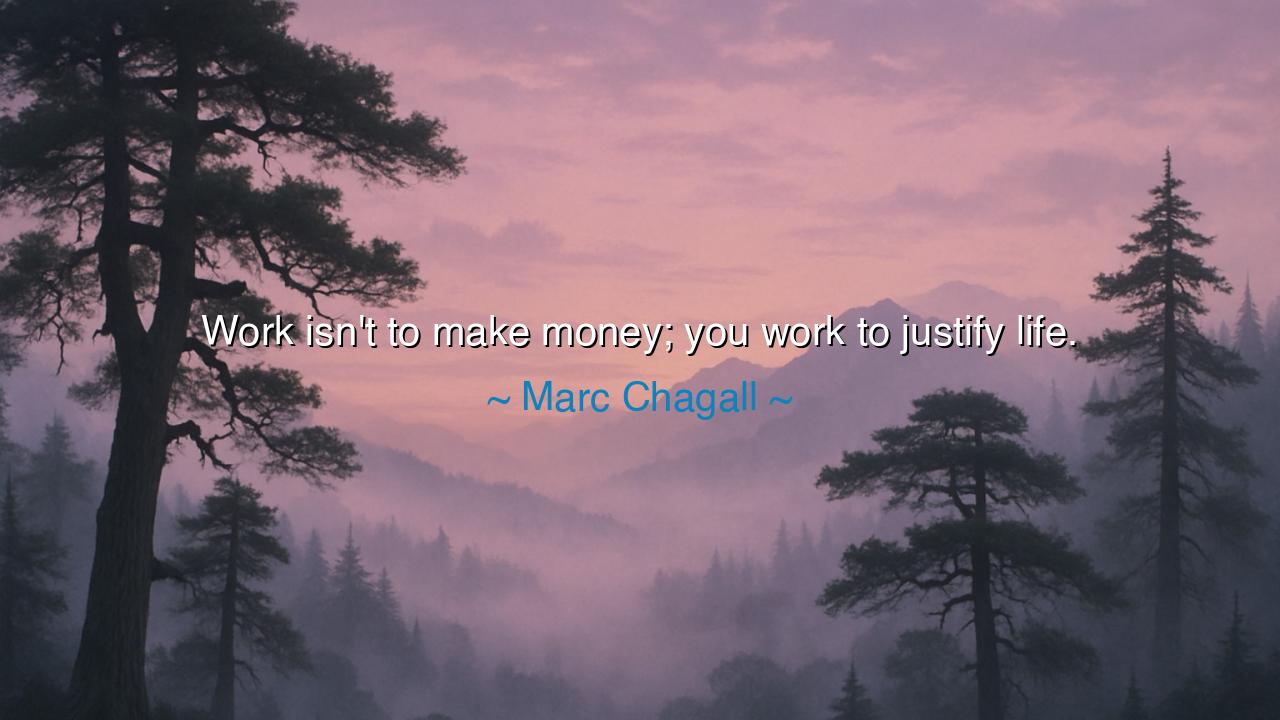
Work isn't to make money; you work to justify life.






Hear the voice of Marc Chagall, painter of dreams and visions, who once declared: “Work isn’t to make money; you work to justify life.” These words strike at the very heart of human existence. For in every age men and women have labored under the sun, some with joy, others with chains. Yet Chagall, who painted the soul of his people in colors that sang, saw that true work is not mere survival, nor the pursuit of coin alone, but the act of giving meaning to one’s brief span upon the earth.
For to see work only as a means of making money is to live as a slave to necessity. Bread may fill the stomach, but it does not fill the spirit. Wealth may build walls, but it cannot build purpose. When the heart beats only for profit, life becomes hollow, and days become numbers to be counted rather than moments to be lived. Chagall knew this truth in his bones, for he had lived through exile and hardship, yet his art soared beyond suffering, proclaiming that life is not justified by possession but by creation.
To justify life is to honor the divine spark placed within every soul. It is to take the clay of time and shape it into something that bears witness: a painting, a song, a field well-tended, a child well-raised, a community well-served. This is the kind of work that outlives the body, that carries meaning into the generations yet to come. The ancients knew this well: the pyramids of Egypt were not built to fatten purses, but to echo eternity; the temples of Greece were not crafted for wages, but to honor gods and inspire man. Work that justifies life is always greater than the worker.
Consider the life of Vincent van Gogh. In his years, he sold almost no paintings, and poverty clung to him like a shadow. Yet his work was not to make money—it was to cry out that beauty and sorrow could exist side by side, that color itself was a hymn to existence. Today, his art is known and cherished across the earth. His hands never held riches, but his brush justified his life in a way that no gold could rival. Through his labor, the world was given new eyes to see.
Chagall himself lived through storms of persecution, exile, and war. Yet rather than yield to despair, he painted visions where lovers floated above villages, where animals danced in joy, where light burned even in dark places. His work was not an escape from suffering, but a defiance of it—a declaration that life, though scarred, is worth honoring. His art justified his days, not through profit, but through the witness of beauty he left behind.
The lesson is clear: do not mistake survival for living. Work must provide bread, yes, but beyond that, it must serve the soul. Each man and woman must ask: What labor can I do that will honor my existence? What can I shape, build, or give that proves I was here, that my days were not wasted? Whether in art, in service, in teaching, in healing, in craft—it is this labor that gives dignity, this labor that makes life shine.
In practice, this means: seek work that reflects your core values, and even if your daily toil is humble, find in it a way to lift life beyond necessity. Do not work only for wages—work also for meaning. When you write, write with truth; when you build, build with integrity; when you serve, serve with compassion. Let your labor be not only the means to live, but the reason life itself is worth living.
So let Chagall’s words ring as a call to all who listen: “Work isn’t to make money; you work to justify life.” Do not measure your days by what you have gained, but by what you have given, created, or made eternal. For when the final hour comes, no man will boast of the coins in his chest—but only of the life he justified through his work.






PPhuong
This quote really makes me reflect on how I view my own work. I’ve often thought of work as a means to an end, but Chagall’s words suggest it could be about something much deeper—connecting with life itself. If work can serve as a form of self-expression or a way to contribute to society, does that mean those who hate their jobs are struggling to find a purpose? Can we reshape our work to give it greater meaning?
MHPham Minh Huy
Marc Chagall’s quote resonates deeply, but it also raises a question about the nature of our lives. If work isn't just for money but to justify life, what does that say about those who are unemployed or unable to work due to circumstances beyond their control? Is the purpose of life solely tied to our productivity, or is there another way to justify our existence?
DSNguyen Dinh Son
I agree with the idea that work shouldn't just be about money, but I wonder how realistic this view is for many people. In today's world, for most, the primary motivation is financial stability. Can someone truly find meaning in work that they don’t feel passionate about? Is it possible to find joy and purpose in every job, or does Chagall assume a level of privilege that most people don't have?
TNTam Nguyen
Chagall's perspective makes me think about work in a more philosophical way. Often, we are driven by the need to earn money, but this quote suggests a deeper purpose for work—it's about finding meaning and justifying our existence. Does that mean if we don't feel fulfilled by our work, we might be missing the point? Can work truly give us that sense of purpose, or do we also need other sources of fulfillment in life?